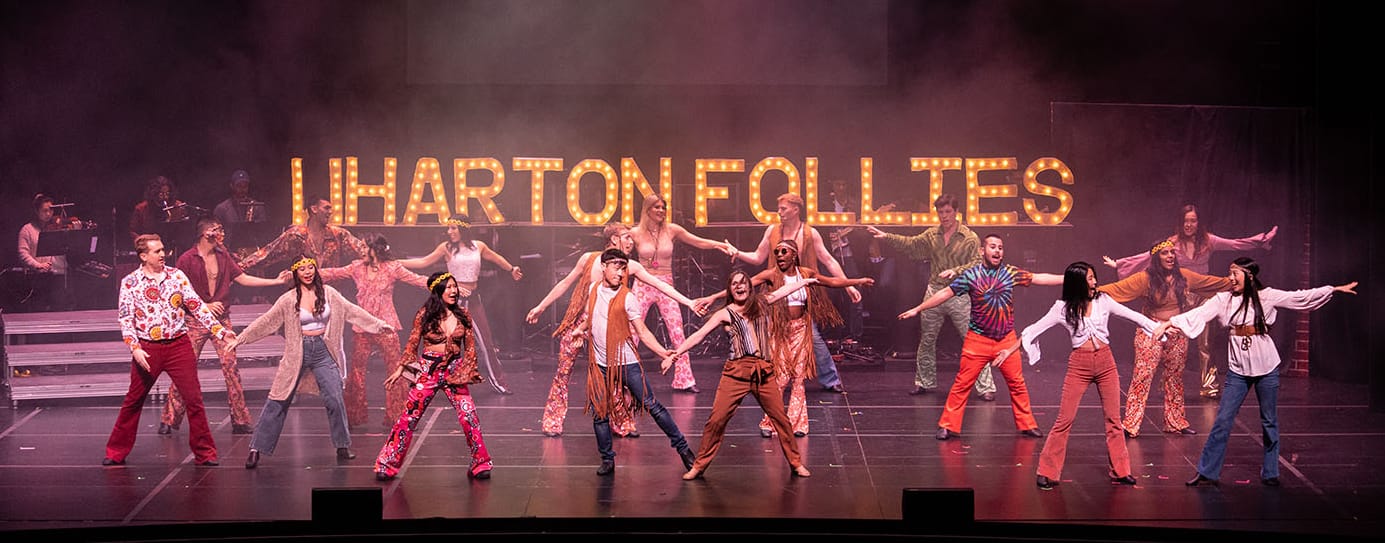On a Saturday afternoon in February, I pass below the Gothic gargoyles of Irvine Auditorium, descend a flight of stairs, and pause outside a nondescript practice hall. The door is closed. But from behind it, a ghostly chant can be heard: “We want Zen … We want Zen … WE WANT ZEN!”
It sounds like the mantra of ravenous yogis, but I quickly learn that something more sinister is afoot. “Zen” is the code name for a secret agent who has infiltrated the student body in an attempt to erode the culture of Wharton. And the ploy appears to be working: Instead of studying or prepping for recruitment, the dozen or so students in the room who were chanting his name begin to sing a song. It’s set to the tune of Lizzo’s “About Damn Time,” but the lyrics have changed — “My grades ain’t fine/ Infiltrate their minds.”
“We’re going to do a speedy run-through of this,” says Travus White WG23, snapping out of character. “From the top.”
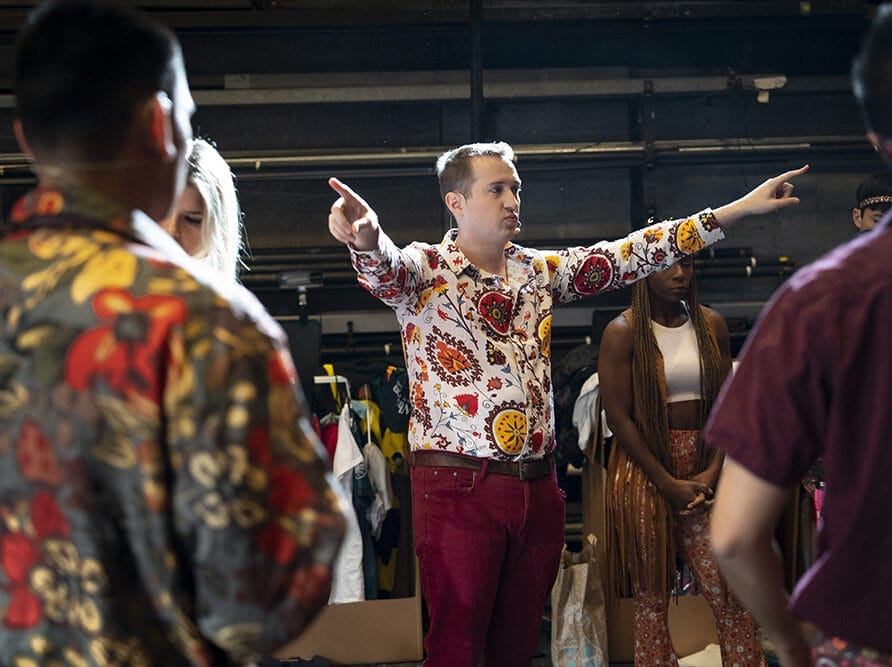
MBA Life Is a Cabaret: Cast director Travus White WG23 gets into character.
In reality, what I’m witnessing is a cast rehearsal for one of the most elaborate, creative, and oddball traditions to hit campus every year: the Wharton Follies. It’s the highly anticipated annual moment when otherwise ambitious, sane, even predictable business students go completely wild, performing a complex piece of comedic theater that makes rollicking fun of the MBA pressure cooker. The idiosyncratic humor found in this year’s show, which is loosely based on the movie 21 Jump Street, pokes fun at everything from the busted escalators in Huntsman Hall to Adam Grant’s bald head.
“Our job is not to create the best musical or the best re-creation of a movie, but rather to find a vehicle to satirize and enjoy the people that we’ve shared this time with, the things we’ve experienced together,” says Nolan Becker WG23, one of the head writers for this year’s show.
Each year, Follies members collectively spend thousands of hours producing an original show from scratch, handling everything from set design to script writing to assembling a live band. For many of the roughly 75 first- and second-year students who comprise the Follies, it’s the apex of their time at Wharton.
“It’s definitely one of the most impactful leadership roles I’ve ever had in my life,” says Kurt Smith WG13, now CEO of Fexa, a software startup. “How do I get the best out of people? How do people balance output vs. having fun? All of those dynamics were things we were learning about conceptually in the classroom. And then here, you’re being asked to motivate a group of amateur comedy writers who aren’t being paid any money.”

The Follies cast huddles backstage on opening night in February before their first number of the evening, set to Earth, Wind & Fire’s “September.”
Each of the so-called M7 business schools has a “follies” group. Unlike at Wharton, most of the others put on a few sketches here or make an SNL-style video there. They’ll poke fun at their favorite professors or the MBA job market and call it a day. But the Wharton Follies are a different breed. Since 1977, students here have been putting on multi-hour shows that today sell out Annenberg’s Zellerbach Theatre. The production value has escalated to the point of rivaling off-Broadway plays. “Other schools may talk a big game,” says Smith. “I want to be on the record to say that with our Follies, there’s no equal.”
In addition to secret agents, this year’s show will feature a shirtless dance routine, a riff on Frozen’s “Let It Go” (transformed into “Pret to go/Line’s too slow!”), an impersonation of management professor Zeke Hernandez, toilet seats, hockey injuries, bribes to the World Trade Organization, gurus, padawans, and yachts. About the only thing that’s not laughable about the Follies is the participants’ intense dedication to making this all work.
“Part of the value of the MBA experience is leaning into something you didn’t have time to do before,” says Becker, a former minor-league baseball pitcher. “You come here to swing for the fences.”
Like so many campus traditions, this one began with pizza and beer. A small group of thespians liked to meet at local watering holes, and among their favorite topics of conversation was the 1975 Broadway sensation A Chorus Line, one of the buzziest bits of pop culture at the time. Even after a few rounds, the students couldn’t get the songs out of their heads. “I’d seen it about a half-dozen times,” says Tom Gooding WG77. “I thought the lyrics just lent themselves to the MBA job-search process.”
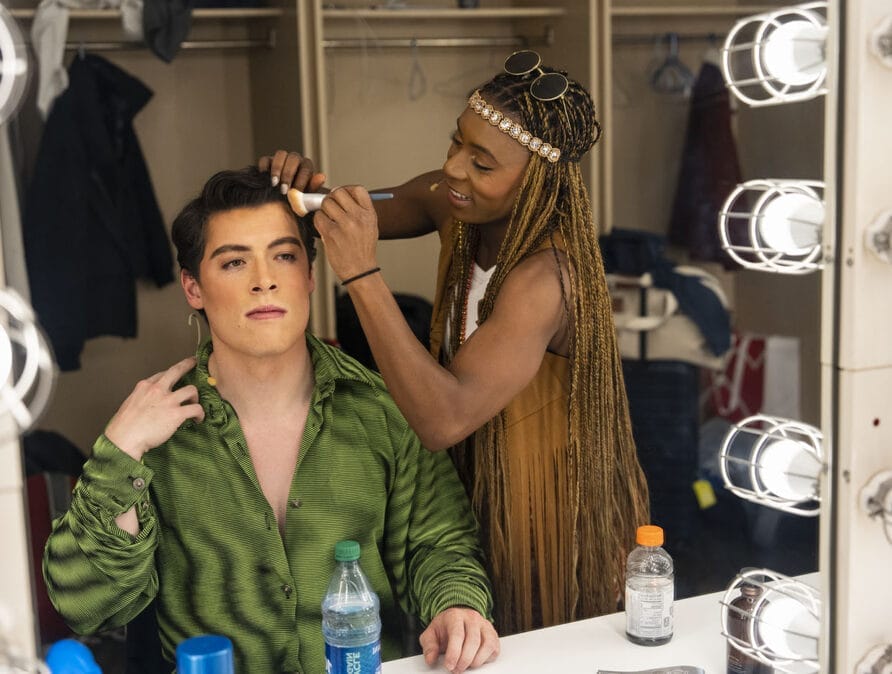
Aidan Cleary WG24 and Mary Joseph WG23 prepare to take the stage.
Among the group of friends, one was an accomplished pianist; another was a playwright. Then there was Gooding, who led Duke’s musical theater group as an undergrad. The friends thought: Why not a spoof? A satire quickly took shape. They grafted the angst of their own lives onto a musical about dancers vying for jobs in New York City. They turned the famously raunchy “T and A” lyrics into “Suits and Vests.” They swapped “At the Ballet” for “In the Journal.” In a playful prelude to the era of Move Fast and Break Things, none of the Whartonites thought much about the potential consequences of what they were doing. “This was before the day when people were worried about intellectual property and stuff like that,” says Gooding, who served as executive producer of the first show. “We just went ahead and didn’t call any of the creatives behind A Chorus Line.”
As the Daily Pennsylvanian noted on February 4, 1977, the first show was a novel addition to the Wharton community. After paying $2.50 per ticket, the audience at Annenberg Auditorium was treated to an opening musical number in which a performer sang, “Who am I anyway?/Am I my résumé?” While the show sold out, Gooding notes that the student paper didn’t quite know what to make of its odd mash-ups: “A Wharton ‘musical comedy’ is incongruous at best. An equivalent paradox might be an Engineering School ‘crafts fair,’ or a Wistar Institute ‘sing-along,’” declared the DP.
“I’m sorry to say that I remember it well,” says Gooding, still flashing tongue-in-cheek humor. “My Johnny Carson routine clearly was the high point of the show, let’s be honest.”
None of the original participants could have foreseen that A Placement Line — the title for the first Follies parody — would have such staying power. “I do marvel that it’s lasted 40-plus years. Your normal perspective on business students is that they’re serious people,” says Gooding. “You’re only there for two years. I’m really pleased there’s always another group to come in and carry it forward.”
While the core concept remains the same, the Follies have evolved over the years to embrace the times. Today, the program is more of a multimedia experience than its early predecessors, featuring slick slideshows and prerecorded sketches that are woven into the song-and-dance-heavy narrative onstage. The targets of the humor have changed, too; whereas Johnny Carson and three-piece suits were muses for the original Follies, today it’s Amazon case studies, ChatGPT, and the food trucks along Spruce Street.
“It’s kind of like a time capsule,” says Lukun Zhang WG23, one of two executive producers of this year’s 21 Walnut Street. “It’s for all of us to remember the fun stuff, all the really absurd stuff that happened.”
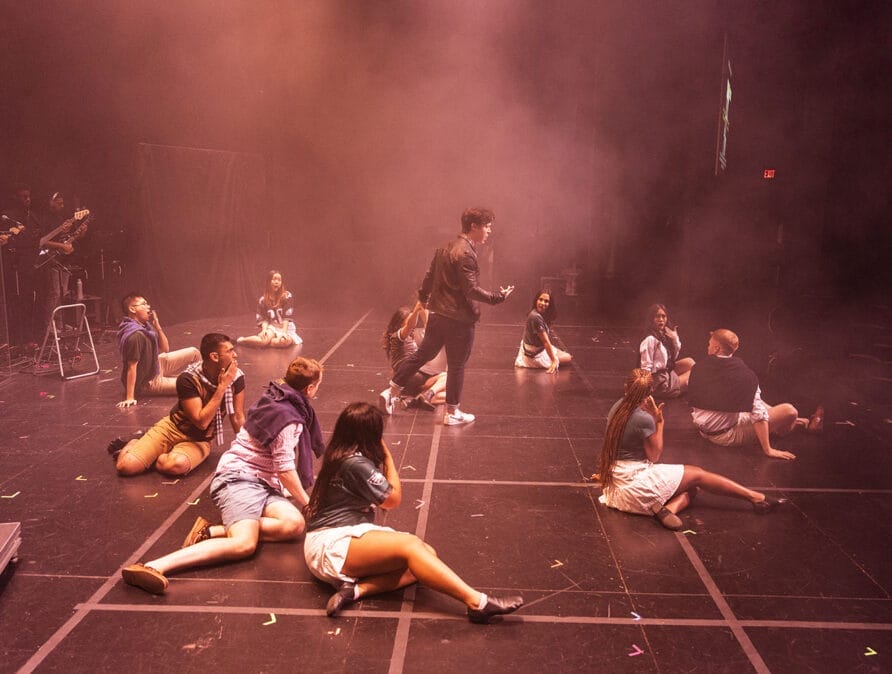
The Room Where It Happened: The 21 Walnut Street cast rehearses a song-and-dance routine, complete with live band and smoke machine.
To go back through the annals of the Follies is to gaze through the eyes of MBAs from any given era as they responded to the hot-button issues of their time in the business world. Take the performance in 1986, titled Yield to Maturity. The plot was about a baby left on the doorstep of two investment banks and raised as a capitalist wunderkind. A year before the movie Wall Street was released and Gordon Gekko became a household name, the Follies were tackling themes of greed and ambition — albeit via Gloria Estefan songs and Three Stooges skits.
Some of what’s been preserved in this time capsule might be best left to memory. “To this day, I have not shown my children the Follies,” says Eriko Clevenger Pope WG99, holding up a VCR tape over Zoom as she recalls the memories. “I dressed up as Michael Jackson, acted like him onstage, and did a full three-minute performance going absolutely crazy.” While her King of Pop ode may be cringe-worthy to look back on, that’s part of the fun of it for Pope: “One of these days, my kids will see another side of Mom that they have no idea existed.”
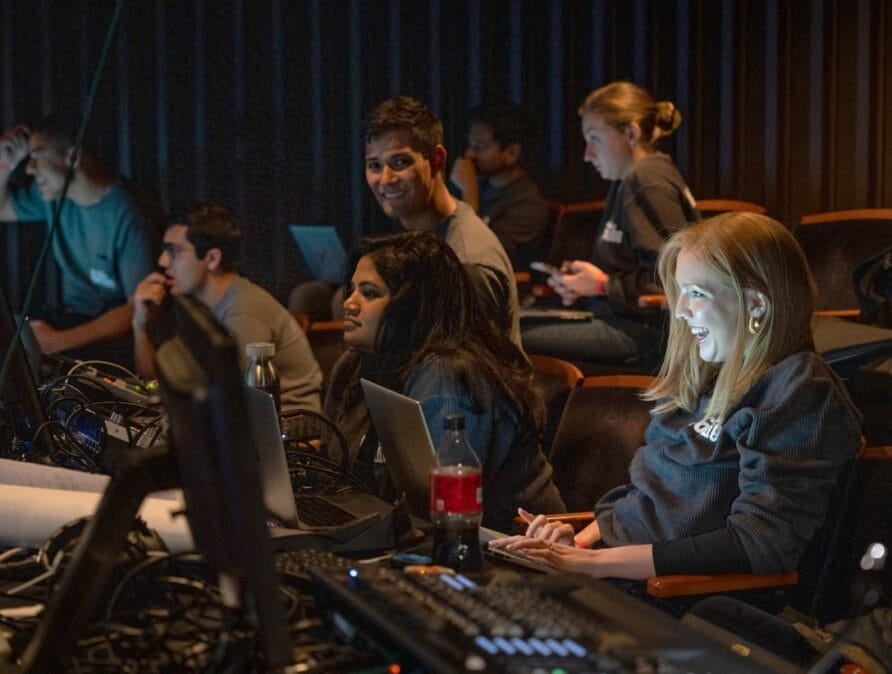
The Follies writers get a laugh from seeing their work in action during rehearsal.
Pope, who has worked as a marketing exec for multinational companies and now runs her own brand-management firm, credits the Follies for some of the valuable skills she gleaned at Wharton. “This concept of storytelling and conveying your ideas in a non-linear way is a valuable asset,” she notes. “How do you have executive presence? How do you create an impression on the audience? How do you tell a narrative in a way that is received as intended? It’s all part of that stage experience.”
Over the years, Follies shows have even been a way to remember beloved staff and faculty. Kurt Smith got to impersonate former deputy vice dean of student life Kembrel Jones in a video skit during one of his years in Follies. Smith, who grew up in Tennessee, felt a special bond with Jones, an Alabama native. If imitation is the sincerest form of flattery, Smith’s Wonka-esque impersonation of Jones in a video was adulation on the next level. In the skit — one of the most-watched pieces of Follies content on YouTube, with more than 11,000 views — Smith’s incarnation maintains a maniacal smile throughout as he grooms students’ eyelashes as part of the Wharton welcoming committee and hands out “happy pills” from a vial. “He would joke about taking happy pills,” Smith says. “It was just a funny joke he used to make off the cuff. So we kind of took that to the extreme.”
Jones passed away in 2022, and Smith appreciates that the goofy Follies ode is now a poignant reminder of his spirit: “He truly did everything he could to help people maximize their experience for two years. And he did it with such humility and style.”
In a sense, Follies is, at its core, about viewing the MBA experience through a lens of humility — pausing to step back and laugh at an environment that’s populated by a select few overachievers and where the stakes often feel sky-high. On a Wednesday night in February, I sat in on a writers’-room meeting less than two weeks before opening night. The auteurs, some 20 in number, were huddled around laptops on the ground floor of an apartment about 10 blocks from campus. Instead of the pizza and beer that fueled their ’70s forefathers, these students feasted on Shake Shack and White Claws.
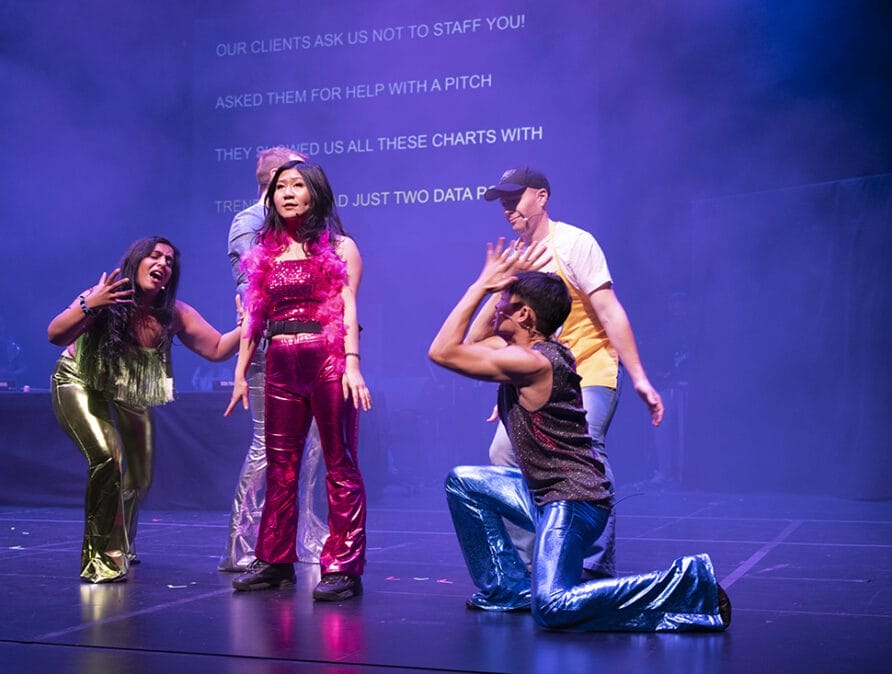
Showstoppers: Chelsea So WG23 (in pink) and castmates sing a parody of “Mamma Mia.”
While the show is only performed for two nights in February, the Follies are a year-round enterprise, with work beginning six months prior to opening night. The fall 2022 semester started with auditions, callbacks, and a weekend retreat in Atlantic City at which the writers settled on the concept and a lot of the script for this year’s extravaganza. From there, the Follies forged ahead like a well-oiled machine, culminating in a rehearsal week in February that featured 12-hour days for much of the cast and crew.
At the time of my visit, the writers were putting the finishing touches on the multimedia elements of the show. During set changes, the Follies play scripted videos. (Example: a spoof of the NFL Scouting Combine at which MBAs run through Excel drills in front of employers.) Throughout the performance and off to the side of the stage, a slideshow accentuates the fast-paced jokes in the script and lyrics. There are hundreds of these FFD (“Follies For Dummies”) slides, as they’re called, often flashing the source material for what’s being parodied at a given moment in the play, such as screenshots of cringe-worthy group chats or videos of MBAs doing body shots.
In an era of quick-trigger outrage, the Follies players try their best to balance satire with attention to their relationships with each other and with the School. Lots of scrutiny goes into the slides, to make them funny but also to try to ensure no one is unduly offended.
The writers’ room could be biting but also quite considerate of others’ feelings. “Would you make this same joke if you were alone in a room with this person?” Shub Dhir WG23, one of the lead writers, asks while discussing a bit of borderline material with the group. The goal is to spark laughter, not to damage anyone’s career. “The FFDs are the main reason we don’t put the full show on YouTube,” adds writer Sophia Ronga WG24.
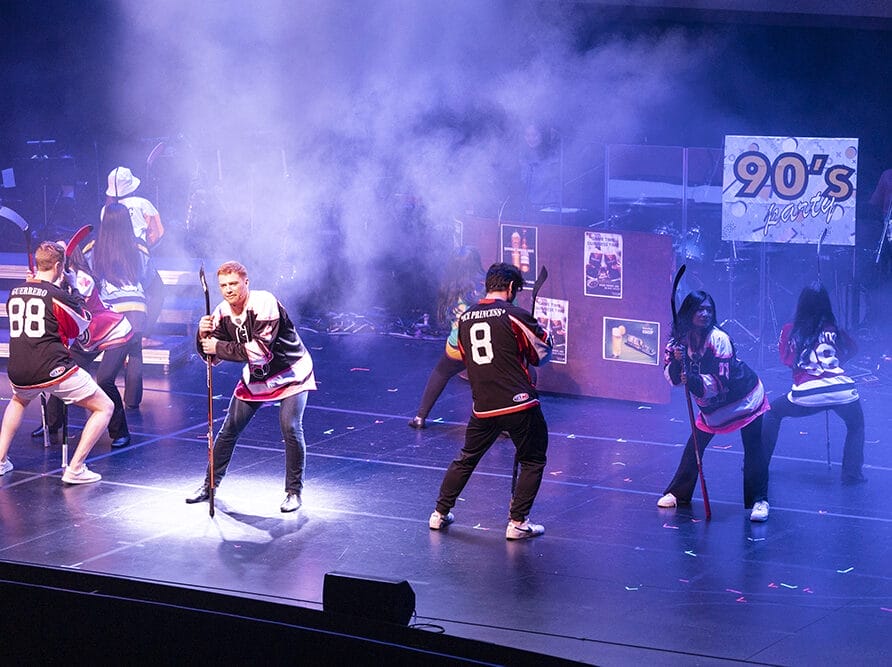
Follies travels back to the ’90s.
At the same time, the authors do try to pack in as many shout-outs of the MBA student-body members as possible, referencing, either by name in the script or in the slides, a few hundred individuals over the course of the evening. They’ll poke fun at a classmate’s book on consulting, or that event nobody attended, or the student who’s notorious for misbehaving in the back of afternoon lectures. By featuring so many Whartonites in the show, the Follies flatten the embarrassment for everyone. “Sometimes, there’s excitement [within the audience] around the ‘mean-spirited’ angles of making fun of people,” says Becker. “But I think there’s enough space to make the show celebratory and jesting.”
The vibe in the writers’ room was like that at a cafeteria table full of the smartest kids in school who don’t take themselves too seriously. One by one, participants workshopped jokes for an SNL-style “Weekend Update” video that would later be published on the group’s Instagram. In addition to the twice-a-year performances, the Follies have found new ways of roasting the School, on social media. Many of the jokes inspired fits of laughter and can’t be repeated in this magazine, including a zinger that compared the dating scene at Wharton to Eagles fans climbing lubricated light poles on Broad Street. Other gags took aim at everything from a classmate’s online chronicle of hamburgers (“I think I have a screenshot of her 200th burger,” someone notes) to the high volume of torn ACL ligaments on the Wharton ski trip.
This intense, collaborative, self-deprecating atmosphere is at the heart of what makes the Follies so special for its members and, ultimately, so funny for its audience, year after year. “What you remember [about Wharton] is really the people and connections that you made, the friendships, the wacky experiences,” says alumna Pope. One of her castmates wound up singing at Pope’s wedding. Two more got married themselves. And when former Folliers run into each other at reunions, they all half-jokingly bring up reprising their plays. “With Follies, there’s definitely a family feel to the whole thing,” Pope notes.
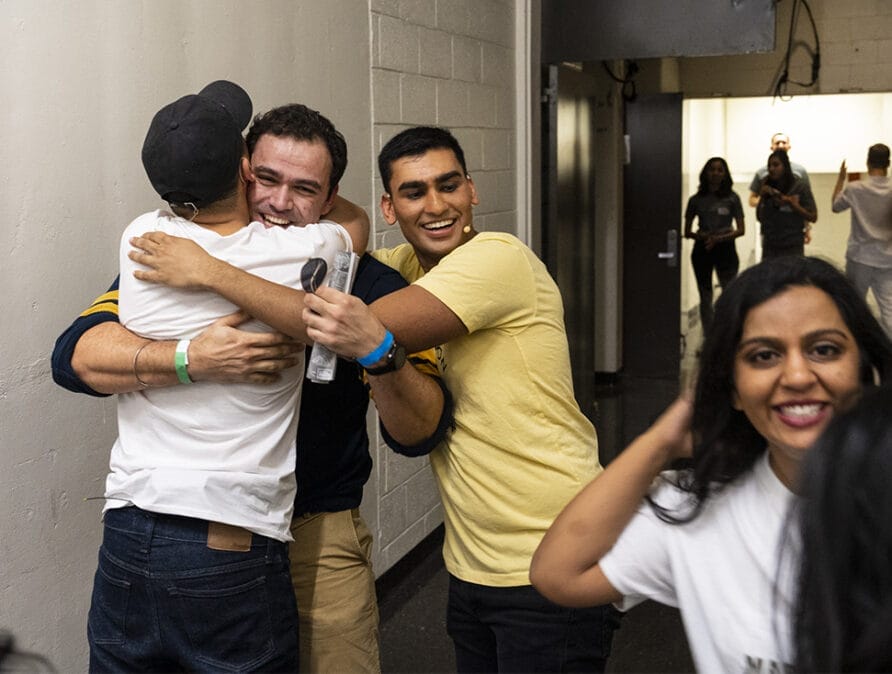
Performers share hugs and laughs backstage on opening night.
It’s the process of making fun of one another that creates a sense of belonging for many members. “I suffered from imposter syndrome, and I was wondering, seriously, what was I doing there?” says Matt Hoffman WG87, a real-estate investment principal in Boston. But once he joined the Follies, he eased into the experience after realizing that not all his schoolmates were cutthroat: “Laughter brings people together. And we’re still laughing at things we knew were terrible.”
Kurt Smith met some of his lifelong friends on the first night he showed up to try out for the group 11 years ago. “I mean, some people at Wharton do hard-core athletics; some do adventure travel,” he says. “For me, it was sitting in the back of Cavanaugh’s bar, eating a chicken panko sandwich, drinking a beer, and making my friends laugh.”
The secret-agent espionage was just one of many storylines to fuel three-plus hours of laughter inside the sold-out Zellerbach Theater on a spring-like night in February. An outsider to the MBA experience would surely have been lost, but that’s partly the point. The Follies are an elaborate inside joke by and for the community.
“It’s really nice to have a space to step back and explore the zany characters that are here,” says co-executive producer Jenna Czeck WG23. “That’s one of the joys of Follies that people look for.”
Most of the time, what unfolded onstage was less about the plot lines and more about the punchlines, with crosshairs fixed on everything Wharton — from a joke about professors recycling the same three Amazon case studies to a beloved alumnus who’s always available to Zoom with students. Fellow students were put on blast, and clubs — ski and snowboard, PE/VC, and more — were skewered. And then there was Aidan Cleary WG23, who earned raucous laughs playing management professor Zeke Hernandez in a scene in which he explained the true definition of the MBA acronym: “Mediocre but arrogant.”
It’s all in good fun at a Follies show, because while the creators are mocking the self-seriousness and idiosyncrasies of their community, they understand themselves to be a part of it. What the founders parodied in 1977 — their on-campus bubble and the larger world that awaits after graduation — is still the focus of today’s Follies, and still in the name of amusement. “When Stephen Colbert is making an absurd show that’s somewhat true about the state of America, that’s more concerning,” says Becker, noting the surreal nature of taking a two-year time-out from life to study business. “Those who can’t see it — they might be a little too far out of touch.”
Malcolm Burnley is a freelance writer and podcaster living in Philadelphia.
Published as “Funny Business” in the Spring/Summer 2023 issue of Wharton Magazine.




















